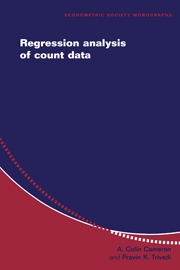Book contents
- Frontmatter
- Contents
- List of Figures
- List of Tables
- Preface
- 1 Introduction
- 2 Model Specification and Estimation
- 3 Basic Count Regression
- 4 Generalized Count Regression
- 5 Model Evaluation and Testing
- 6 Empirical Illustrations
- 7 Time Series Data
- 8 Multivariate Data
- 9 Longitudinal Data
- 10 Measurement Errors
- 11 Nonrandom Samples and Simultaneity
- 12 Flexible Methods for Counts
- Appendices
- A Notation and Acronyms
- B Functions, Distributions, and Moments
- C Software
- References
- Author Index
- Subject Index
- Titles in the series
C - Software
Published online by Cambridge University Press: 05 January 2013
- Frontmatter
- Contents
- List of Figures
- List of Tables
- Preface
- 1 Introduction
- 2 Model Specification and Estimation
- 3 Basic Count Regression
- 4 Generalized Count Regression
- 5 Model Evaluation and Testing
- 6 Empirical Illustrations
- 7 Time Series Data
- 8 Multivariate Data
- 9 Longitudinal Data
- 10 Measurement Errors
- 11 Nonrandom Samples and Simultaneity
- 12 Flexible Methods for Counts
- Appendices
- A Notation and Acronyms
- B Functions, Distributions, and Moments
- C Software
- References
- Author Index
- Subject Index
- Titles in the series
Summary
Many widely used regression packages, including LIMDEP, STATA, TSP, and GAUSS, support maximum likelihood estimation of standard Poisson and negative binomial regressions, the latter of these in a separate count module. LIMDEP also supports the QGPML versions of the standard models, maximum-likelihood estimation of truncated or censored Poisson, geometric and negative binomial models, and ZIP and sample selection models. STATA also supports the generalized negative binomial regression in which the overdispersion parameter is further parameterized as a function of additional covariates. In addition, any statistical package with a generalized linear models component will include maximum likelihood and QGPML estimation of the Poisson, although not necessarily negative binomial. Thus, regression packages cover the models in Chapter 3 and roughly half of those in Chapter 4. The packages vary somewhat in the provision of diagnostics such as overdispersion tests and goodness-of-fit measures.
At the time of writing (late 1997) there is virtually no specialized software for the models presented in Chapters 7 through 12. A notable exception is estimation of basic panel count data models, which is provided by both LIMDEP and TSP. For models for which off-the-shelf software is not available, one needs to provide at least the likelihood function, for maximum likelihood estimation, or the moment conditions and weighting matrix, for GMM estimation. In principle this can be done using many regression packages, or using matrix programming languages such as GAUSS, MATLAB, S-PLUS, or SAS/IML. In practice numerical problems can be encountered if models are quite nonlinear.
- Type
- Chapter
- Information
- Regression Analysis of Count Data , pp. 378Publisher: Cambridge University PressPrint publication year: 1998



